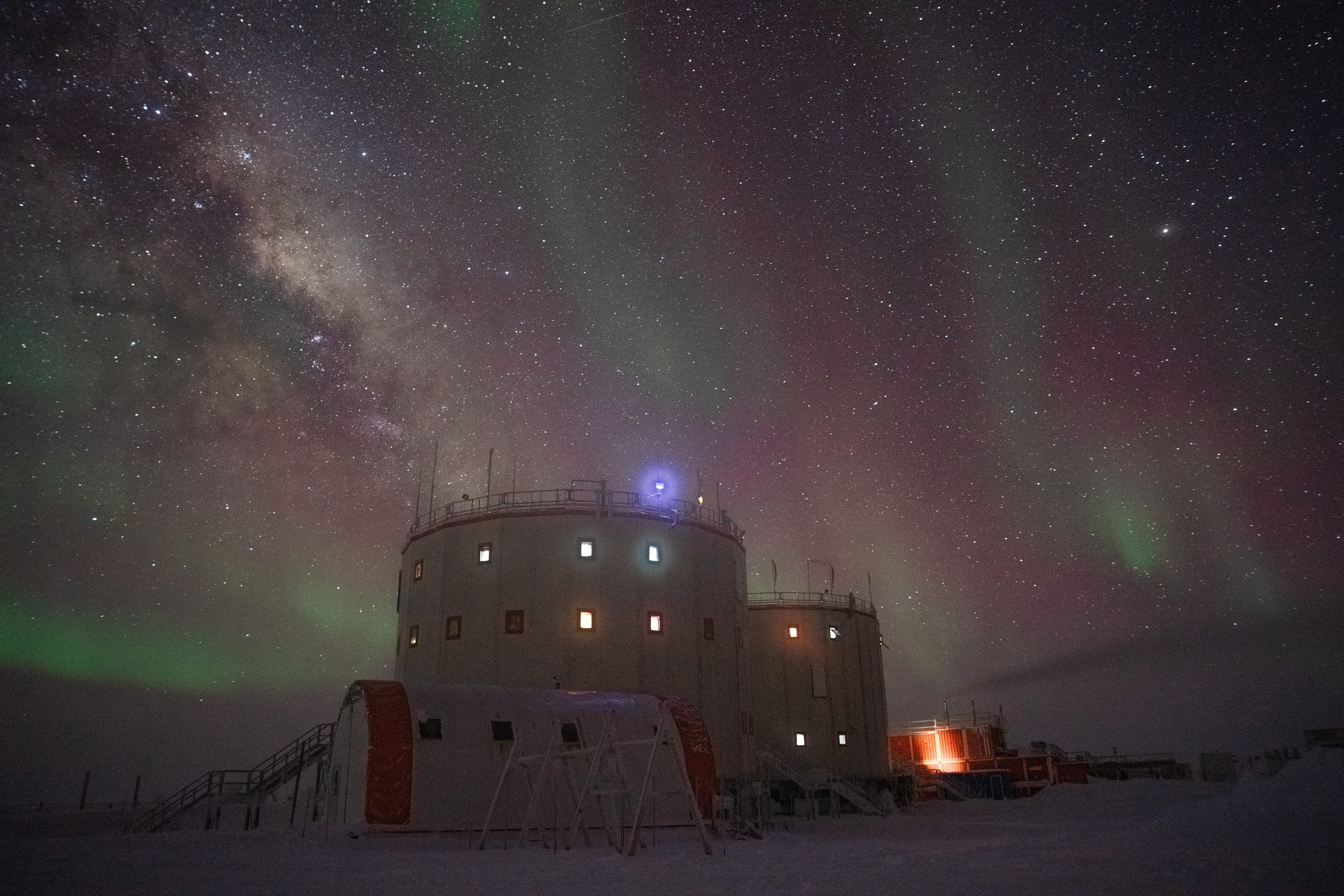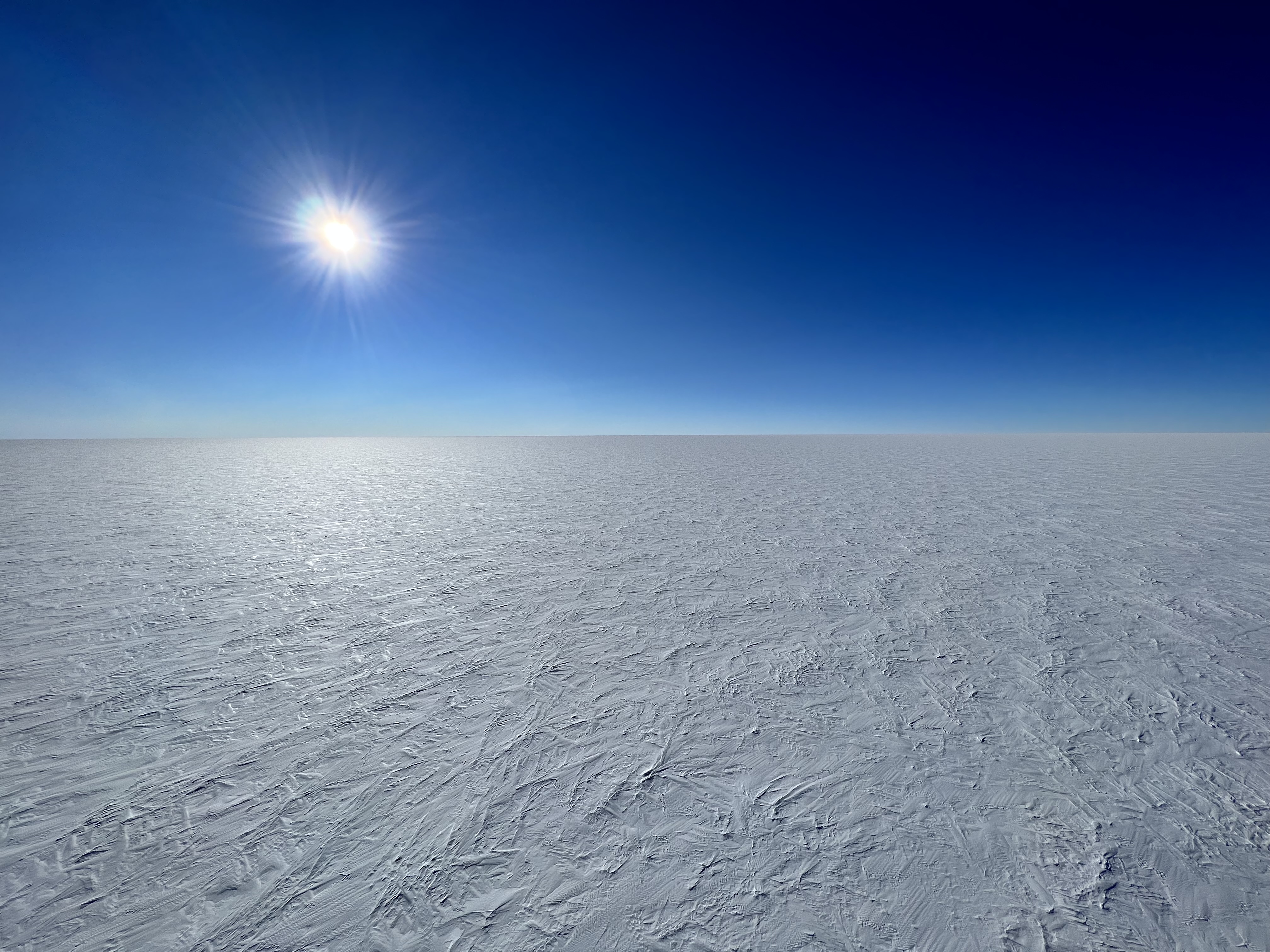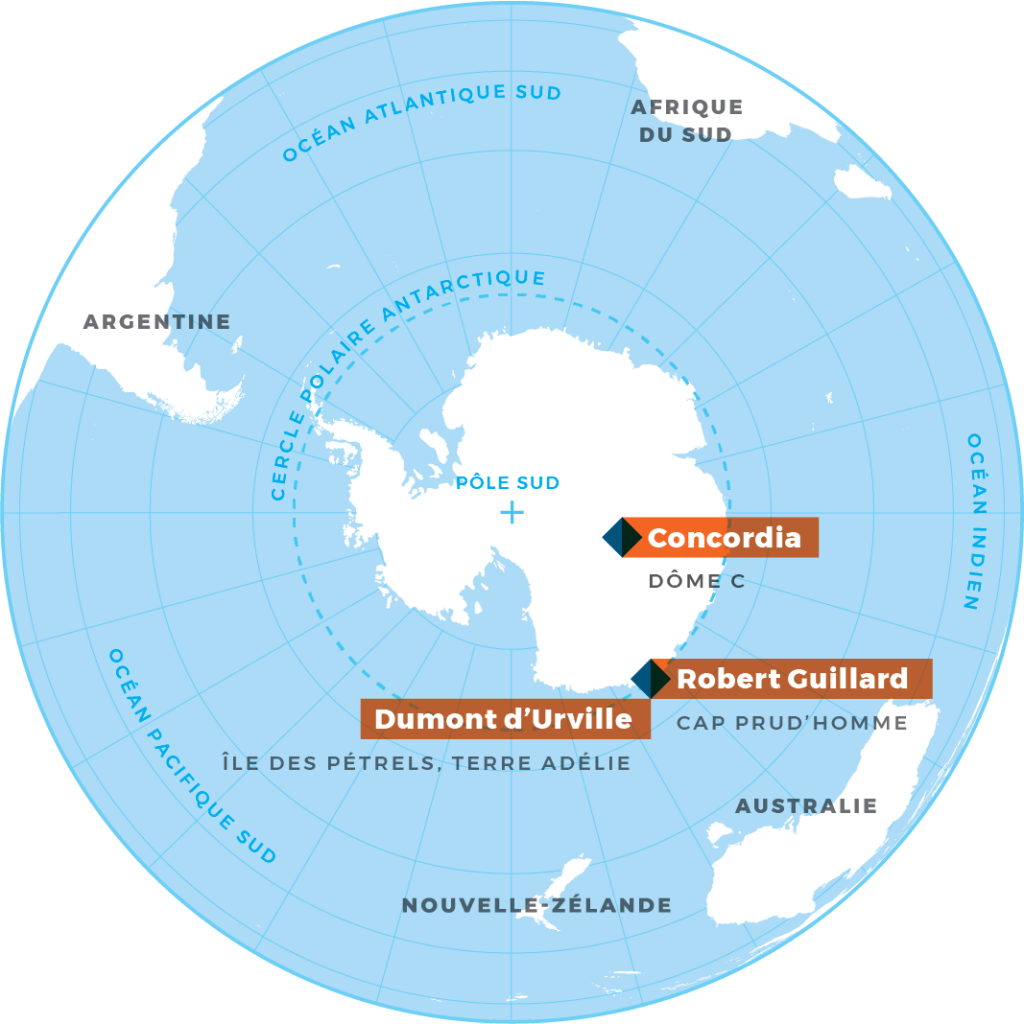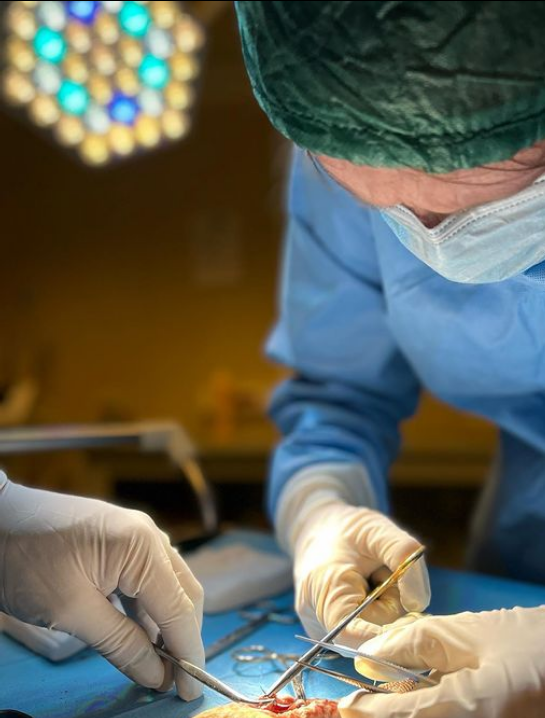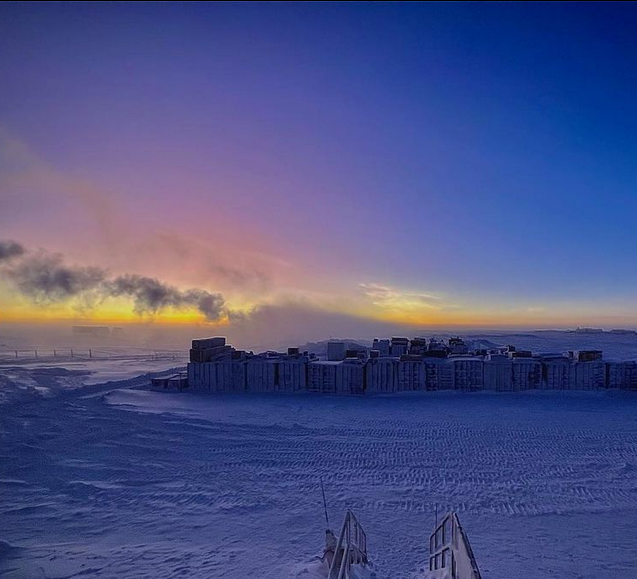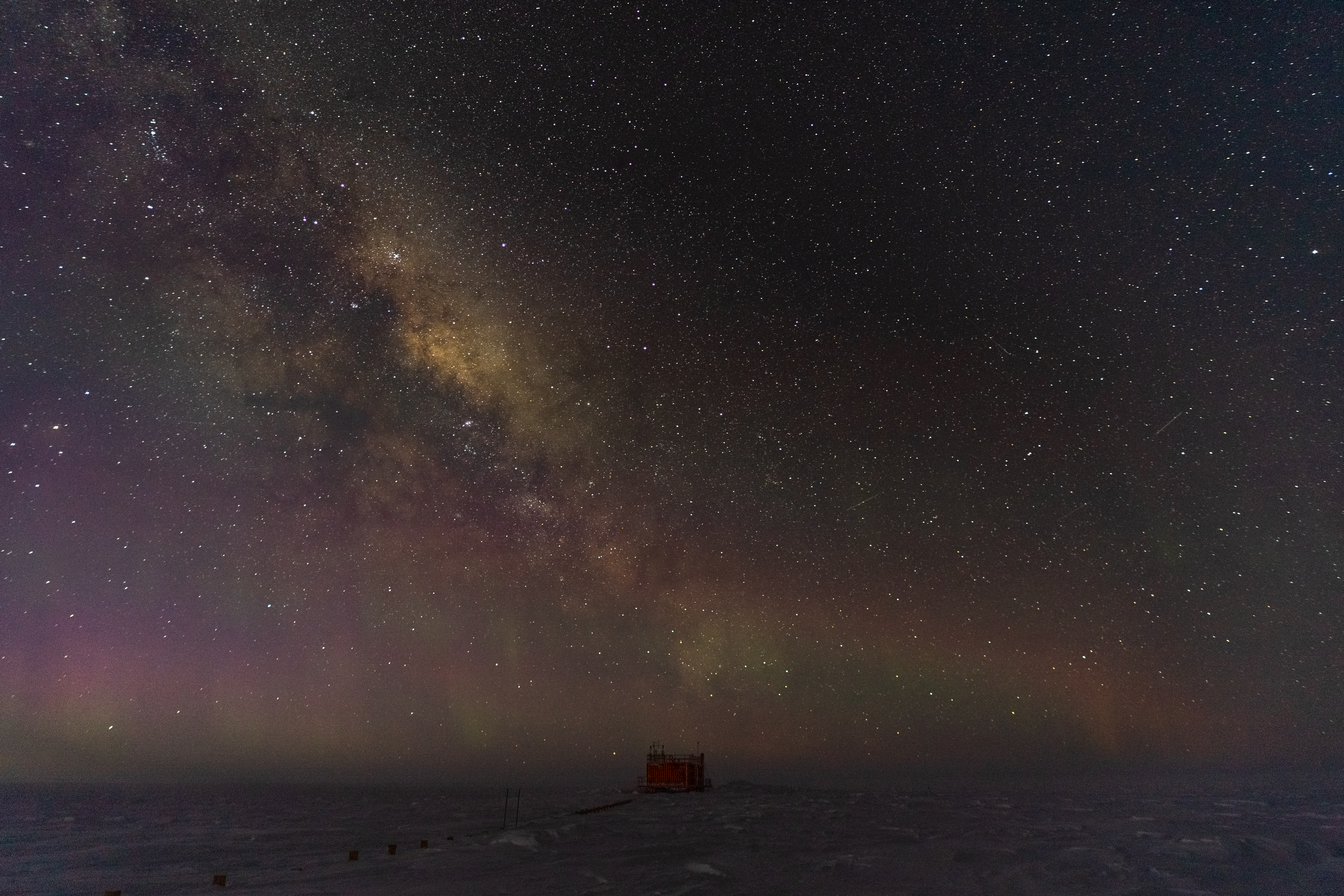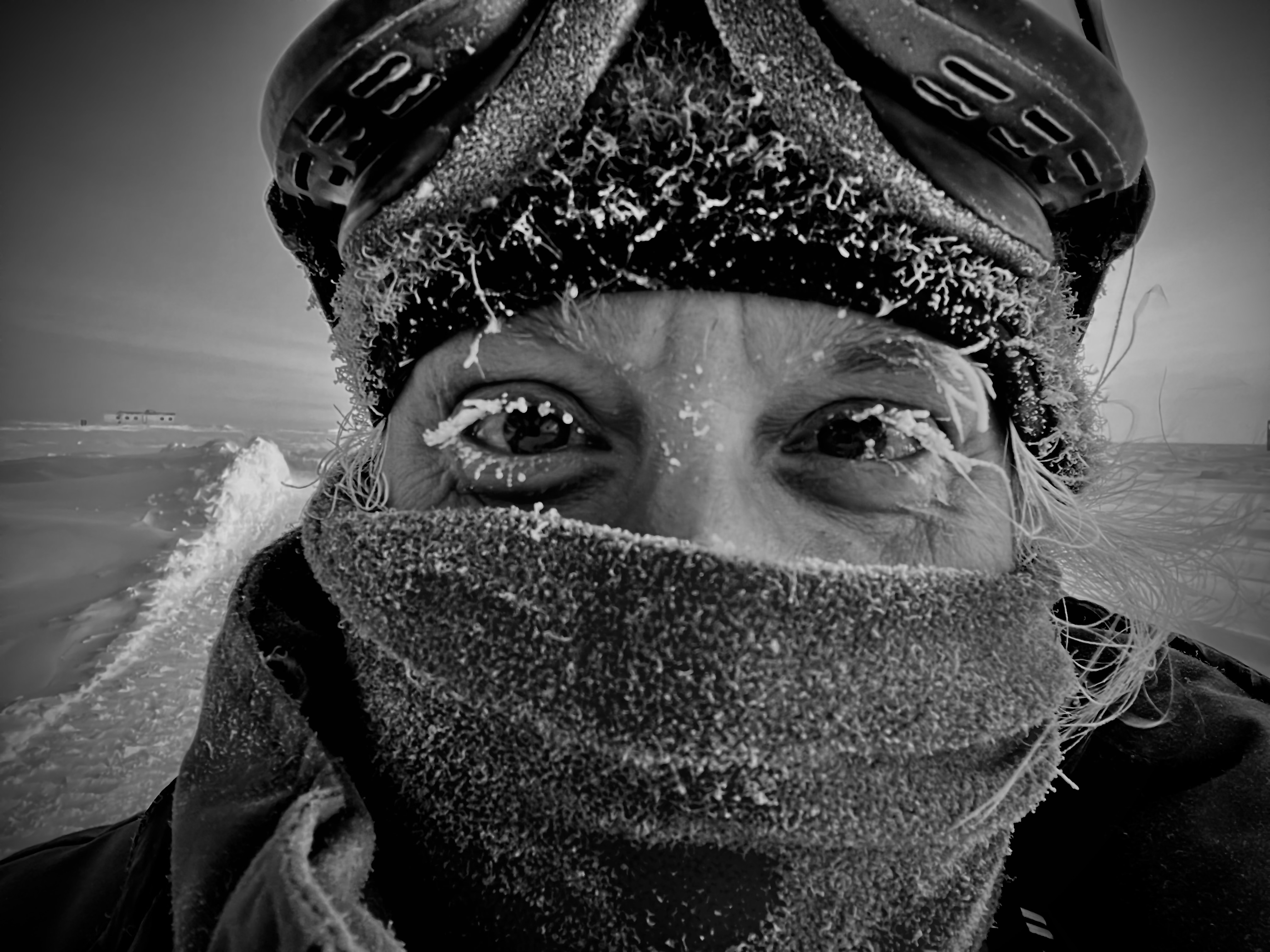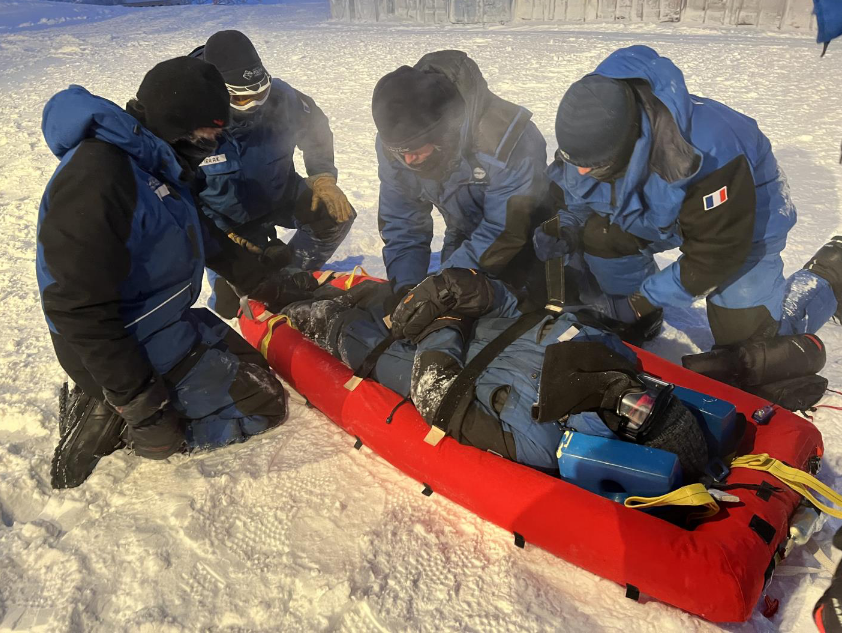- Fabien Farge on instagram
- Photos by Julien Witwicky, glaciologist
- More information on Concordia the website of the French Polar Institute (In French: l'Institut Polaire Français)
- This article has been translated from the original French version
A physician in Antarctica, "the ultimate adventure"
In Antarctica, thirteen people are cut off from the world for nine months. Among them, a physician with heavy duties, yet in an extraordinary adventure.
Fabien Farge surrounded by aurora australis. © Julien Witwicky
About Fabien Farge
Fabien Farge has been the treating physician at the Concordia base in Antarctica for almost a year, and has been completely cut off from the world for nine months. A specialist in isolated medicine, he is also the inventor of a sea rescue drone and a device for evacuating polytrauma victims. Furthermore, as a pioneer in the field of unscheduled medical emergency centres, he is actively involved in the debate on access to care. His portrait can be found at the end of the interview.
Dr. Farge, what are the current living conditions on the Concordia base?
To set the scene, we must start with the most important factor: isolation. This mission will last fourteen months in total, including about nine months of wintering, i.e. isolation. The summer lasts three months, from 1 November to 1 February. During this period, marked by the arrival of the first plane and the departure of the last, there are up to 75 people on the base.
At the moment there are only thirteen of us - twelve men and one woman - and we are totally cut off from the world, with no possibility of evacuation. No aircraft can land here during the winter: it's far too cold. At -55°C, all plastics, glues and composite materials break down.
Concordia is a Franco-Italian base. It is one of three bases - along with a Russian and an American - where teams stay through the winter. Our living conditions are so special that we are referred to as 'winterers', just like spacemen. There is a slight difference: the personnel of the International Space Station can be repatriated if necessary. For us, this is impossible. To date, Concordia is the most isolated place in the universe where human beings live. Only those who go to Mars will dethrone us.
Concordia Base © Julien Witwicky
We haven't seen the sun since 5 May [Editor's note: this interview was conducted on 1 July 2022]. Today it is -72°C outside the base. With the wind blowing at 9m/second, the temperature felt is -90°C. Concordia is at an altitude of 3,200 metres, but it is also one of the three inhabited places on Earth that are closest to the South Pole. The atmospheric pressure is therefore very low. Today, it reaches 620 hectopascals.
In terms of 'felt' oxygen, it is as if Concordia were at an altitude of 3,800 metres. When the pressure drops further, the oxygen available to us is that found at an altitude of 4,000 metres or more. The base is not pressurised so we live like this for months.
Our DC3 plane landed here on 14 December 2021, after a month of quarantine in Hobart, Tasmania. On landing, our oxygen saturation varied between 75 and 80%. I took a little longer to adapt than my younger colleagues, but my O2 saturation is now stabilised at 90% with a haemoglobin of 17 grams. It is as much to say that when we 'come back to earth' we will start galloping!
A few more figures... We often ignore the fact that Antarctica is the driest place in the world: the humidity level in my room is 7%! Finally, the pole is a zone of convergence of cosmic rays: the dose of radiation we receive in one year is equivalent to that received by the crew of an aeroplane in fifty transatlantic flights.
From the top of the American Tower, a 45-metre-high structure that measures wind gradients and temperature. and allows the measurement of wind gradients and temperature.
Can you leave the base?
About once a week. I'm the one who goes out the least because I have less reason than the others to go outside. Above all, as a physician, I have to expose myself as little as possible. The technical staff go out more often, for maintenance operations. For example, they have to empty the sludge tanks because all this waste will be sent back to Australia for reprocessing. The scientists - seismologists, meteorologists, specialists in magnetism or atmospheric chemistry - go out regularly. Not to mention the real polar heroes, the glaciologists.
Concordia is known for the EPICA [European Project for Ice Coring in Antarctica] drilling, a core drill that reaches a depth of 3,200 metres. Analysis of the air bubbles found in the different layers has made it possible to go back in time and show that the CO2 level has never been so high for 800,000 years. Beyond EPICA is another drilling project underway, carried out 37 kilometres from Concordia by a team of ten men for which I am also medically responsible. It will make it possible to go back 1,200,000 years.
Finally, the Ice Memory project being carried out here consists of preserving ice cores from glaciers all over the world, to create a sort of library.
© Institut Polaire Français (French Polar Institute)
Are you the only physician on site?
I am the only one in charge of the health of the winter people. Hannes, a young Swedish phyisician, is doing research for the European Space Agency (ESA). ESA is interested in us because our living conditions are similar to those of spacemen during a flight or a stay on Mars. The average temperature at Concordia, -60°, corresponds to that found there during the summer. Another example: during a flight to Mars, the oxygen level in the spacecraft may have to be lowered permanently. Just like what we experience here.
One of the eleven studies Hannes is conducting is on sleep. Our sleep is analysed every two weeks and during the mission we will have four polysomnography recordings. Previous ESA research has already shown that on Concordia we do not have a deep sleep phase, only REM sleep. Some missions have even experienced complete inversions of the nycthemeral rhythm.
Since we are hypoxic, we hyperventilate during sleep. The resulting drop in CO2 leads to central apnea, so we are awake. This means that sleep on Concordia is not very restorative and that we come out of these missions exhausted.
ESA is also studying the way our reflexes vary, or the variation in taste. There is no smell here, so there are very few stimuli other than food. Most of the eleven experiments conducted at Concordia are carried out in parallel on board the International Space Station. Hannes has more of a research profile. He is a public health physician and is not trained in emergency medicine or isolated medicine. In concrete terms, I am the only one who can deal with a critical situation.
What is a critical situation in isolated medicine?
Something critical is the fact that any situation that would normally be harmless can quickly become extremely problematic here. On an isolated mission, everything is very calm. The famous calm before the storm. The risk is lethargy. Because things go wrong very quickly, and you have to react immediately. The question that lurks, omnipresent, is well known to emergency physicians: it's not "Will it happen?" but "When will it happen?"
For example, in May, I made eighteen consultations. Knowing that there are only thirteen people here, including me, and that we are theoretically all in good shape. A member of the team came for a systematic visit, as he does every three months. I discovered a large ulcerative lesion on the tonsil pillar. He complained of a slight sore throat a few days ago, without fever. When he woke up, his pillow was slightly stained with blood. Of course, I think of neoplasia.
This is where it gets complicated. Murphy's Law obliges, the machine that allows me to do complete blood counts (CBCs) breaks down. Given the appearance of the lesion, I assume atypical Vincent's angina, I put him on Clamoxyl and crossed my fingers. Luckily, that's what it was. But if it had been neoplasia, how would I have handled it? The next plane is in eight months...
Being a physician at Concordia is a constant stress for a year. Every time I look at my colleagues, I imagine an accident. It's an amazing thing, but fortunately it doesn't stop me from sleeping. Claude Bachelard, the former Chief Medical Officer of the TAAF [French Southern and Antarctic Territories] used to say: "There is no reason for it to go wrong, everything will be fine". I hold on to that.
At the end of a previous mission to the sub-Antarctic islands, the second I stepped aboard the Marion Dufresne, I felt as if a heavy iron cloak had been lifted off my shoulders straight away. All the pressures at the base had been weighing on me for thirteen months and I was no longer even aware of it.
What if you are the one who gets sick?
We all know the story of Rogozov, who had to operate on himself for appendicitis. Another story sheds light on our context. In 1998, Jerri Nielsen was the physician at an American base even further south than Concordia. In the middle of wintering, she detected a nodule on her breast. The Americans managed to drop in enough to do a biopsy and start chemotherapy. She did it all by herself, the biopsy, the anapathology examination. Respect. Then she went into remission for five years but unfortunately passed away in 2009.
I haven't been through this kind of ordeal but I have had a few scares. The last one was four days ago. I woke up with a lower back pain. At first I thought it was muscular. The pain increases, moves to the left, it starts to feel like renal colic and the urine test comes back positive. Take my word for it: it's not easy to get a kidney scan in these conditions. If it doesn't pass after 12 hours of anti-inflammatories, what's the scenario? Concordia Hospital is well equipped - mini surgery, radiology, ultrasound - but I don't have an endoscopy or a double J probe.
Hannes is not trained to do general anaesthesia. Anyway, I can't see myself asking him to do an emergency nephrostomy blindly, without an image intensifier. Another example: when I wintered on the island of Amsterdam St. Paul, I broke a molar. I had to give myself an anaesthetic at the Spix spine, using a tractor mirror attached to the chair. I missed the first anaesthetic, and treated the tooth as best I could. According to my dentist I did a good job.
Nicolas, an electrical engineer, trains in minor surgery.
"[Nicolas] is part of the team I trained for ten weeks in first aid and emergency patient management in the hospital and the operating theatre. They will be in charge of helping me, or Hannes, if something happens to me. So I took a lot of care to teach them the right gestures..."
- Dr. Farge
If you need medical advice, what do you do?
I've always dreamt of being able to say, "Here they only take the best of the best, so we never need outside advice" [laughs]. Well, I wish I could say that, but fortunately we have a lot of support. Concordia is a French-Italian base. Normally, the position of physician is held by an Italian. I am the first French physician to winter here. We are therefore linked to a clinic in Rome which provides 24/7 assistance, particularly for surgery. With them, I do an average of one teleconsultation per month.
Otherwise, on the French side, the TAAF have an excellent telemedicine network thanks to the support of the CHU of Reunion. I can easily obtain any specialist advice. If I need to do surgery, I am equipped with a surgical unit with a camera. Ideally, Concordia should be equipped with a remote-controlled camera. A specialist physician could then guide our every move.
What about psychological support?
I have an ally. I came with a good coffee pot. People who are in trouble come to have a coffee. And if they come to have it here, in the hospital, it's not trivial. These moments are very important. I'm used to isolated posts. I've never had a real drop in morale. Like everyone else here, I sometimes get homesick. Sometimes I would also like to see other people.
It's very special to be only thirteen of us, it's nothing like wintering on larger bases. At times like this, I think about the holidays that will follow the mission. I already know exactly what I'll do when I get back... I'll go to Australia to surf the waves at Noosa!
Do you receive specific training before this type of mission?
Unlike in Great Britain, for example, there is no specific Master's type training in isolated medicine in France. The only way to train is to go on a mission with the T.A.A.F. Within this framework, the Army Health Service provides an extraordinary training course that lasts three months. The programme includes surgery, anaesthesia, dentistry, biology, etc.
Then, during the mission, I believe it is essential to continue to train, permanently. It's a way of staying on top of things. At the moment, I am taking part in a MOOC [Mass Open Online Course] on ventilation.
So you have access to the internet?
Rarely, and of very poor quality. We have access to whatsapp, to keep in touch with our relatives. At Concordia, the satellite antenna is tangential to the curvature of the Earth. Basically, the satellites are not overhead but on the horizon, so communications are poor. The bandwidth is low and reserved primarily for scientists for data transfers.
What is a typical day like?
For me, routine is the best way to cope with time passing, otherwise it doesn't 'pass' but 'sticks'. I always wake up at the same time and I dedicate all my mornings to learning. So there's this MOOC, but I also take advantage of being here to improve my Italian with a colleague.
I also work out in our mini gym. 1.5 hours of cardio on a treadmill, 5 days a week. Given our oxygen levels, that's more than enough! Once a week, I go out of the base for a maximum of 45 minutes before the cold forces me to return. Just enough time for a little walk, a moment of solitude and to take some photos.
Apart from consultations, the afternoon is devoted to running the hospital: inventories, procedures, maintenance of equipment, etc. A tedious but essential job. Afterwards, to relax, I play the ukulele. In the evening, we all have our meals together. The same time, the same place, the same menu... It's a bit like a retirement home! Afterwards, we play boccette, an Italian pool table that is played by hand, without sticks, or table football.
There are also board games and a few video games. Around 9pm, some people watch a DVD in our cinema room, others go to read or work on professional or personal projects. Once a month or so we organise parties with games and music. But contrary to popular belief, we don't drink much alcohol at these events, although there is some available.
Recently [at the end of June] we had a very emblematic moment for all winter people. On 21 June, in the heart of winter in Antarctica, the Midwinter festival celebrates the beginning of the gradual return of daylight. The tradition dates back to 1902. Sir Ernest Henry Shackleton, the officer of the Discovery expedition, had this idea to counteract the monotony.
For a week, the Southern and Antarctic bases break the isolation by sending each other their greetings. All the bases on the continent compete in a sort of remote Olympic Games. Some organise sham election campaigns to elect a very short-lived leader. At Concordia we had theme parties with room decorations, fancy dress and fancy food.
Not so easy to find candidates for this job... What would you say to a physician who is reluctant to come?
I would quote Sir E.Shackleton who had published this advert to recruit his boys...
"Seeking men for dangerous journey. Low pay. Freezing cold. Long months of total darkness. Permanent danger. Return not guaranteed. Honour and recognition if successful."
Everything is said, except that honour and recognition are no longer there. Different times, different customs. The good news is that they have managed to find me a successor, a French physician. So I'm not going to go back just yet [laughs]. Professionally, coming to Concordia as a physician is a unique opportunity - in the original sense of the word - to go beyond your own limits. So to build your confidence.
A winterization changes the way you think, because you have in your mind, all the time, this kind of sentence: "If I have to, I'll do it, I'll operate on this guy, because there's no one else within 800 kilometres who can do it, and if I don't do it he'll die." When the mission ends, you realise that you have taken on this, that you have experienced something out of the ordinary. You come out of it different, grown up.
In human terms, wintering is an ultimate and intimate adventure. Concordia is another planet, where life outside the base does not exist and is not welcome. Only people who have experienced a wintering can understand what it is like. It creates a very strong bond between us, a kind of 'esprit de corps' similar to what you find in the army, among those who have been to the fire together.
At the end of the wintering, we don't need to talk to each other: we only need to look at each other to understand what the other is thinking. It's very strong and very special. The condition is to arrive at Concordia with a good dose of empathy but also of adaptability in human relations. "Soft on the hind legs', as one of my bosses put it.
There is one last reason to come here. At Concordia we see things that only we on Earth can see. Last week, we were looking at the monstrous auroras encircling the base. To see them, we only had to walk 25 metres. There are very powerful telescopes here. This is no accident. Everywhere else in the world, when you look at the stars with binoculars you see that they are shaking. This distortion is due to the thermal layers. Here, the thermal layer is only 35 metres thick on average, barely 5 metres when temperatures are very low. With the total absence of light pollution during the polar night, the clarity is incredible.
© Julien Witwicky
At Concordia, when I leave the base and lie on my back, I am like an astronaut on a spacewalk. I'm flying among the stars. The fifty-year-old emergency physician becomes the seven-year-old who dreamed of going into space.
Fabien Farge, physician of extreme settings, and inventor
Fabien Farge, 52, turned to isolated medicine when he was in his thirties. A logical path for this adventurer who has already explored 12,000 kilometres of South America with his father, motorbike expeditions in West Africa and the crossing of Madagascar by mountain bike. Not forgetting an anthropo-nutrition mission in which he participated as a physician and researcher. This was an opportunity to live for three months with the Oyampi tribe, at the source of the Oyapock, on the border between French Guyana and Brazil.
Dr Farge came to isolated medicine in 2007. His current mission to an Antarctic base is the fourth of its kind. As a physician, he has already spent thirteen months on the island of Amsterdam Saint-Paul and another five on the island of Crozet. Fabien Farge also provided medical coverage for the French Polar Institute's Antarctic Raid. During the southern summer, a team of ten people supplies Concordia from the Dumont d'Urville base on several occasions. The tracked tractors preceded by snow groomers covered 1,100 kilometres in a fortnight. The convoy delivers up to 200 tonnes of equipment and fuel and then evacuates Concordia's waste on the way back. For the physician, this mission lasts a total of three months.
Dr Farge continued this experience of isolated medicine by working regularly on oil platforms. With a fellow emergency physician, Dr Racine, he is notably at the origin of an offshore pre-hospital emergency service in Angola. Throughout his professional career, he has never stopped training: hyperbaric medicine, disaster medicine, emergency medicine in the maritime environment, aeronautical and space medicine, etc.
Technical and organisational innovations
Fabien Farge, is also the inventor of the Helper1 drone, designed for maritime rescue. The device locates the swimmer in difficulty, drops a self-inflating buoy and allows him to communicate with the rescuers while waiting for them to arrive.
About Helper
Awarded at the Concours Lépine in 2016, Helper has already saved ten lives in France, the first country in the world to protect its beaches with drones. In the wake of this, a partnership with the manufacturer Schiller aimed to transport a miniaturised defibrillator by drone. The COVID-19 pandemic interrupted this project.
Another of Dr Farge's inventions is the Man Over Board (MOB). It was during a mission on an oil platform that he came up with an alternative to the "shell" mattress. The aim was to facilitate the extraction of victims with multiple injuries following a fall from a great height into the water.
Fabien Farge then adapted the MOB for use in Antarctica and tested it in Concordia in real conditions. The MOB has two advantages: it can be used at temperatures below -50° and the presence of a hard surface allows it to be used in "portage + sled" mode. This device has recently been commercialised by the French industrial group Safran.
Dr Farge's innovations are also organisational. When he is not on a mission, he lives in Biscarosse where he has been a correspondent physician for the French SAMU (Service d'Aide Médicale Urgente or Urgent Medical Aid Service) 40 for twenty years. It was in this town that he opened one of the first seasonal unscheduled emergency centres in 2001, a structure that still exists today.
Fabien Farge is constantly thinking about new ways of organising emergency services to meet the shortage of emergency physicians in certain areas. Since Concordia, he has been participating in a working group led by the ARS.
Notes:
1. The Helper drone
